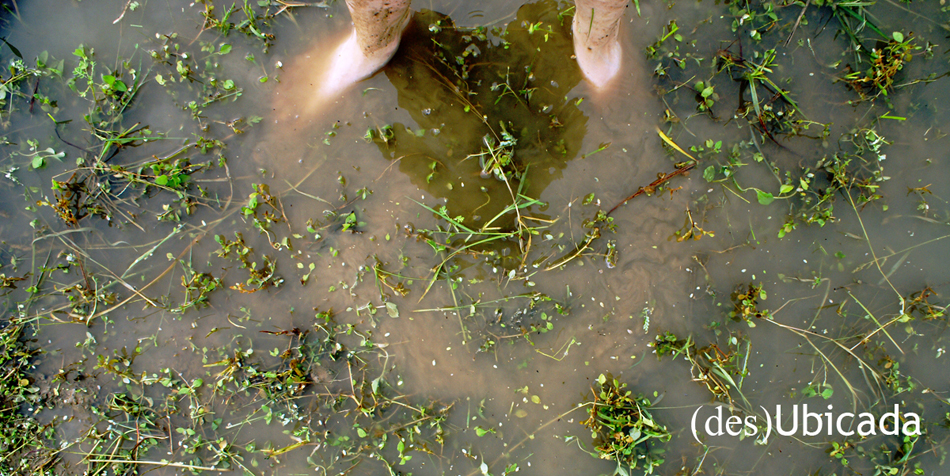El cap de setmana passat vaig anar per segona vegada en rickshaw. En un ciclo-rickshaw, dels que son conduits per homes a cop de pedal. Vaig voler anar al centre a comprar-me roba. Basicament el que buscava era una camisa ample, un shawal que en diuen aqui. Les noies que veig pel campus acostumen a vestir aquest shawal, pantalons amples o estrets tipus pitillo (la ultima moda es veu) i un mocador al col, tot ben enconjuntat. Es el que porten la majoria de noies solteres, mentre que les casades porten el tradicional sari.
Samir i Keiko em van deixar en un dels carrers principals del Chowk (el barri vell) tot animant-me amb "ganbatte"! Despres de pujar i baixar el carrer unes tres o quatre vegades vaig aconseguir fer les meves compres (un shawal i un parell de mocadors). Mission cumplida. Vaig girar-me tota decidida cap al rickshaw que m'atossigava en aquell moment: "Do you know Allahabad Agricultural Institute?". Cara estupefacta, esmaperduda, en bavia, cap senyal de comprensio. Pot ser la meva pronunciacio no era prou india. Tres o quatre wallahs mes tard en vaig trobar un disposat a tornar-me a casa.
Samir i Keiko em van deixar en un dels carrers principals del Chowk (el barri vell) tot animant-me amb "ganbatte"! Despres de pujar i baixar el carrer unes tres o quatre vegades vaig aconseguir fer les meves compres (un shawal i un parell de mocadors). Mission cumplida. Vaig girar-me tota decidida cap al rickshaw que m'atossigava en aquell moment: "Do you know Allahabad Agricultural Institute?". Cara estupefacta, esmaperduda, en bavia, cap senyal de comprensio. Pot ser la meva pronunciacio no era prou india. Tres o quatre wallahs mes tard en vaig trobar un disposat a tornar-me a casa.
Us haig de confessar que vaig disfrutar. Em va encantar poder observar els carrers d'Allahabad a un ritme mes huma (mai millor dit) i a tant poca distancia. Malgrat tot, em va deixar un regust agredolc. No em va acabar d'agradar tenir aquell home pedalant i suant per portar els meus kilos al campus. Aquest home es guanya la vida amb aixo, es clar, pero personalment (em podeu dir bleda i amb rao) em feia patir. I es que no veuras un ricksaw wallah amb un kilo de mes... Potser es que ser portada d'aquesta manera em fa sentir encara mes madam.
Segurament tornare a necessitar els serveis d'un rickshaw wallah, pero intentare agafar-lo com menys vegades millor. Pero us recomano plenament l'experiencia! I sobretot, regategeu!!!

Last weekend I had my second rickshaw ride. It was a cyclo-rickshaw, those driven by a man cycling (pretty obvious, ne?). I went to the old center to do some shopping. I was looking for a shawal, similar to a wide shirt. The girls around the campus usually wear it, together with wide or tight trousers and a scarf, all matching. Single woman wear this, while married ones stick to the traditional sari.
Samir and Keiko droped me in one of the streets of the Chowk (old town) while encouraging me with "Ganbatte!". After going up and down the street three or four times I managed to buy some things (a shawal and a pair of handkerchiefs). Mission accomplished. Then I turned to the rickshaw which was harassing me in that moment: "Do you know Allahabad Agricultural Institute?". There was no sign of understanding in his face. Maybe my pronunciation was not enough indian. Three or four wallahs later I found one willing to take me back home.
It was my first rickshaw trip alone. When you are up there you can feel the animal and human environment of the street surrounding you. You feel like you can caress the child running by near you if you want to... The vehicle moves forward slowly, following the movements of the wallah's legs and the fluidity of traffic. It's not very stable, with parts that look like their are going to fall at any moment, everything creaking here and there. Most of them are colorfully painted, not in a corporative way like taxis, but in a more indian style. In the back part they draw ornaments framing images of gods, animals or sceneries... They told me that the paintings are different in each state.
I must confess I had fun. I enjoyed having the chance to observe Allahabad streets in a more human rythm and such a close distance. On the other hand, I was not completelly happy with it. I didn't like having a man cycling and sweating to take my kilos to the campus. The man earns his living doing that, of course, but personally (maybe I am too sensitive or) I couldn't help suffering for him. You won't see a fat rickshaw wallah... Maybe being carried this way makes me feel even more madam...
Us haig de confessar que vaig disfrutar. Em va encantar poder observar els carrers d'Allahabad a un ritme mes huma (mai millor dit) i a tant poca distancia. Malgrat tot, em va deixar un regust agredolc. No em va acabar d'agradar tenir aquell home pedalant i suant per portar els meus kilos al campus. Aquest home es guanya la vida amb aixo, es clar, pero personalment (em podeu dir bleda i amb rao) em feia patir. I es que no veuras un ricksaw wallah amb un kilo de mes... Potser es que ser portada d'aquesta manera em fa sentir encara mes madam.
Probably I am going to need another ride in a rickshaw, but I will try to use it as few times as possible. But I fully recommend the experience! And above all, bargain!!!
Dixit: "Sir you are finished?"







